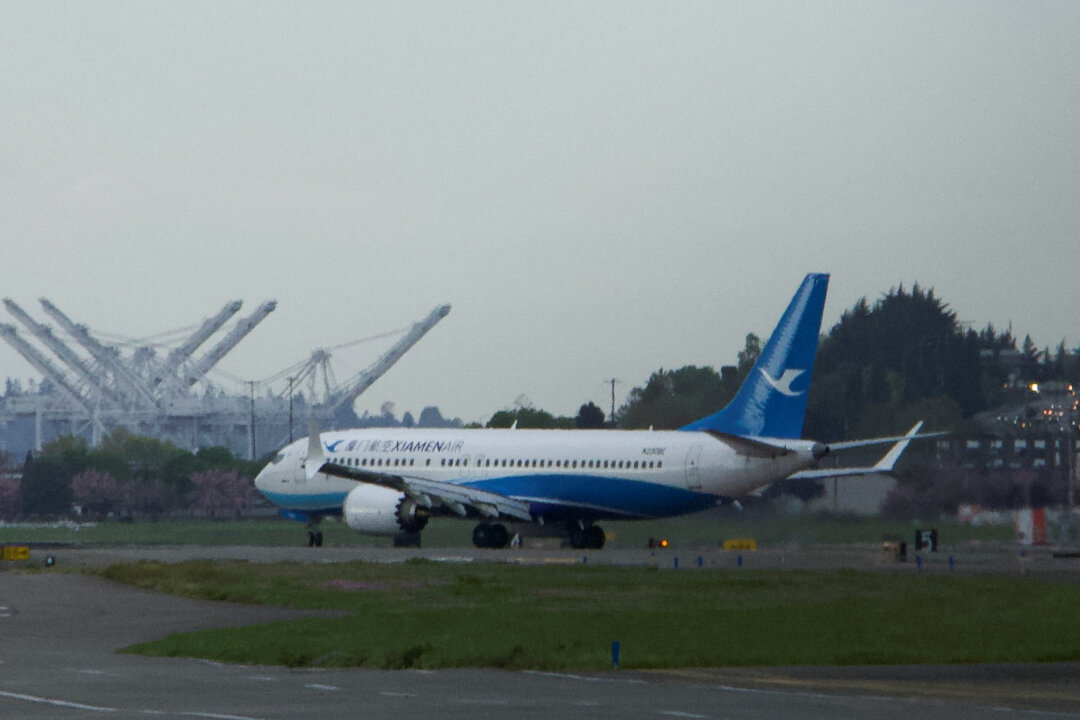It’s not clear who made the final decision to return the 737 Max to the United States, as neither Boeing nor China’s Xiamen Airlines provided an explanation.
A Boeing plane that was intended to be used by a Chinese airline landed back in the aerospace manufacturer’s U.S. production home on April 19, as tensions build between the United States and China over an ongoing tariff war.
Meant to be used by China’s Xiamen Airlines, the 737 Max jet landed at Seattle’s Boeing Field just after 6 p.m. local time, photos showed.
The plane, painted with Xiamen’s branding, was one of many 737 Max jets waiting at Boeing’s Zhoushan completion center for last-minute work and delivery to a Chinese carrier. It made refueling stops in Guam and Hawaii on its roughly 5,000-mile journey back to the United States.
President Donald Trump raised baseline tariffs on Chinese imports to 145 percent, triggering a retaliatory 125 percent tariff from China on U.S. goods.
Due to the new tariffs, a Chinese airline taking a delivery of the roughly $55 million Boeing jet could be significantly impacted by the import taxes, according to IBA, an aviation consultancy group.
It’s not clear who made the final decision to return the 737 Max to the United States, as neither Boeing nor Xiamen provided an explanation.
The 737 Max, which remains Boeing’s best-selling model, has been embroiled in multiple safety incidents since the two fatal 2018 and 2019 crashes that killed all occupants on board.
In 2024, a 737 Max door panel ripped off an Alaska Airlines flight right after takeoff, prompting the Federal Aviation Administration to increase its oversight of Boeing.
Saturday’s return of the 737 Max intended for Xiamen is a sign of disruption in new aircraft deliveries after the industry enjoyed decades of duty-free status in trade.
The ongoing tariff war also comes as Boeing has faced a nearly five-year import freeze on 737 Max jets.
Industry analysts say the confusion over the rapidly shifting tariffs could leave many aircraft deliveries in limbo, as some airline CEOs have suggested they would rather defer delivery of jets than pay the duties.
Amid reports last week that China might be ordering its airlines to cease taking further deliveries of Boeing jets, the U.S. plane manufacturer’s shares dropped by 2.5 percent on April 15. Before that, shares had fallen by 10 percent so far this year.
The tariff war between the United States and China has caught Boeing in the middle, with ongoing negotiations leaving little certainty as to where the ceiling may be on tariffs imposed by either nation on the other.
On Friday, Trump said top Chinese officials had reached out to broker a deal and said he does not want China to “go higher, because at a certain point you make it where people don’t buy” from the American market.
The president suggested that he may have a deal with China to end the tariff war “over the next three or four weeks.”
Reuters contributed to this report.

